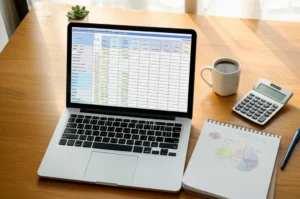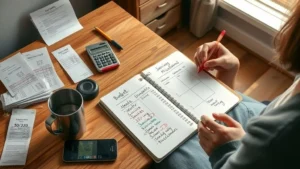Hey, I get it. Managing money as a young adult can feel like juggling flaming swords—exciting but kind of scary and messy. Maybe you’re trying to stop living paycheck to paycheck, or you’re just starting to think about saving up for that dream trip or buying your own place someday. Either way, a few solid budgeting tips for young adults can totally change your financial game without making you feel deprived or stressed.
This isn’t about turning your life upside down or giving up all the fun stuff. It’s about learning smart, practical ways to take control of your cash flow so you can have peace of mind and still enjoy the things you love. Ready to dive in? Let’s break down some of the simplest but most powerful ways to start budgeting—for real.
Why Budgeting Matters
What Budgeting Can Do for You
So, you might wonder, why bother budgeting? Well, it’s not just about crunching numbers. Budgeting is like giving yourself a financial roadmap. It helps you:
- Keep your expenses in check and reduce those surprise “where did my money go?” moments.
- Build confidence around money decisions and avoid unnecessary debt.
- Save for goals that actually matter to you, like a cozy apartment, a degree, or that awesome concert ticket.
Plus, when you budget, you gain this cool superpower: money control instead of money controlling you.
The Risks of Skipping It
Skipping budgeting? You’re basically handing your money a free ticket to chaos. Without tracking, it’s way easier to spend more than you earn, pile up credit card debt, or miss out on future plans. According to studies, many young adults who struggle financially often didn’t start budgeting early enough — leading to stress and missed opportunities.
What the Experts Say
Experts stress the importance of budgeting for young adults as a cornerstone of financial stability, no matter your income level. Even small changes, like tracking your daily coffee runs, can add up in a big way.
Simple Budgeting Principles
Step One: Track Everything
Before you get overwhelmed, hear me out. Tracking your money doesn’t have to be complicated. Jot down every expense—yes, even that $2 snack. You can go old-school with a notebook, or use apps and budgeting tools for young adults that automatically categorize your spending. The point is to see where your money flows so you can decide where to put it next.
Needs vs. Wants
This classic budgeting rule keeps you honest. Your “needs” are essentials like rent, utilities, groceries, and transportation. “Wants” are for your streaming subscriptions, dining out, or buying those cute shoes you spotted online. When in doubt, ask yourself: “Do I absolutely need this to live comfortably?” If the answer’s no, maybe it’s a want.
Pay Yourself First
Here’s a golden tip that financial pros swear by—set aside savings before spending on anything else. Automate transfers to your savings or emergency fund account as soon as your paycheck hits. This way, saving isn’t just an afterthought; it’s built into your budget.
Sample Budgets to Get You Started
Build Your Budget Step-by-Step
Want a simple way to organize your money? The 50/30/20 rule is a great starting point:
| Category | Percentage of Income | Example Expenses |
|---|---|---|
| Needs | 50% | Rent, utilities, groceries, transportation |
| Wants | 30% | Entertainment, dining out, hobbies |
| Savings & Debt Repayment | 20% | Emergency fund, investments, loan payments |
You can tweak these percentages depending on your lifestyle—for example, if you’re still saving aggressively or have student loans. Zero-based budgeting is another option, where every dollar you earn is earmarked for a specific purpose, making you super intentional about spending.
Sample Budget Examples for Young Adults
Let’s say you earn $2,000 monthly after taxes:
- Student with Part-Time Job: Rent $600, Food $300, Savings $400, Fun $300, Miscellaneous $400
- Entry-Level Job, Sharing Rent: Rent $700, Transport $150, Savings $500, Fun $350, Debt Repayment $300
For freshers or gig workers with irregular income, the trick is to use your lowest monthly income as a baseline, and save any extra when you get it.
Need more examples? Check out this sample budget for young adults for some ready-to-use blueprints.
Practical Tips That Really Work
Top 10 Financial Tips Paired with Budgeting
Budgeting is great, but pair it with these tips to level up:
- Track daily expenses—even small ones add up.
- Build an emergency fund for life’s curveballs.
- Cut subscriptions you don’t use.
- Automate bill payments and savings.
- Avoid impulse buys by waiting 24 hours.
- Use credit cards wisely; pay off balances monthly.
- Start small with investing early on.
- Review your budget monthly and adjust.
- Shop around and compare before major purchases.
- Celebrate your savings wins—reward yourself!
Want more? Don’t miss these comprehensive 10 financial tips for young adults that go hand in hand with budgeting.
Form Habits That Stick
Building a budget means forming habits. Try setting a weekly “money date” where you review your spending or update your budget. It’s like checking in with yourself—no judgment, just data. A friend of mine started doing this and says it made budgeting less intimidating and even kind of fun.
Best Budgeting Tools for Young Adults
Choosing Your Weapon
There’s a sea of budgeting apps out there. From free to paid, simple to super detailed. Some favorites include Mint, YNAB (You Need a Budget), and PocketGuard. If apps aren’t your thing, Google Sheets has great free templates that you can customize to your style.
Pick What Works for You
Simplicity is key here. A fancy app won’t help if you don’t stick with it. Look for tools that sync to your bank accounts and send alerts for bill payments or overspending. This will save you that dreadful “Oops, I forgot” moment.
Keep Your Info Safe
Security matters. Stick to trusted apps or bank-official tools to avoid phishing or scams. Look for features like multi-factor authentication and data encryption. Trustworthy financial tools protect your peace of mind.
Save, Pay Off Debt, Invest Smartly
Emergency Fund First
Think of this as your financial safety net. Aim for 3 to 6 months’ expenses set aside. Start small—$500 is better than zero. Build it up steadily while you tackle debts.
Paying Down Debt
Debt can drain your budget without you realizing it. Prioritize high-interest debts first (hello, credit cards!). Balance paying them down while contributing to your savings so you’re covered in a pinch.
Your Money’s Growth Potential
Savings under your mattress won’t grow, but small investments can. Even $50 a month into a simple retirement account or a low-risk fund can snowball over time. The power of compound interest is like planting a money tree—you water it now, and it grows years later.
Handling Life’s Changes with Budgeting
Big Life Transitions
Got a new job? Moving out? College life starting? Each change shakes up your money flow. Revisit your budget and prioritize essentials first. Maybe cut back on wants temporarily, or increase savings if you get a raise. Flexibility is your friend here.
Irregular Income? No Worries
If you’re freelancing or juggling gigs, your income might feel like a rollercoaster. Create a buffer fund for low-income months, set a “baseline budget” based on your leanest earnings, and save the extras during good months.
Course-Correct: Avoid Common Budgeting Mistakes
Don’t Ignore The Small Stuff
Those little purchases can sabotage the best plans (hello, daily lattes). Track everything to get the full picture.
Watch Out for Hidden Costs
Fees, interest, subscriptions accumulating quietly—they add up. Spot them early by reviewing statements regularly.
Balance is Everything
Super strict budgets can feel like chains. Allow some wiggle room for treats; it keeps motivation alive and reduces the risk of burnout.
Keep Improving Your Budget Routine
Regular Reviews
Set a monthly or quarterly date to review where your money went, what worked, and what didn’t. Adjust your budget as your life and goals evolve.
Re-budget When Needed
Got a new job, an unexpected expense, or a side hustle? Time to revisit your budget. Make small tweaks rather than huge leaps.
Trusted Resources to Learn More
Helping yourself with trusted info makes a difference. Financial literacy sites, nonprofit organizations, and budgeting communities offer tons of reliable guides. For example, explore financial tips for young adults or dive into detailed budgeting templates at sample budget for young adults.
Wrapping It Up
Alright, you’ve got the basics—and then some. Remember, budgeting isn’t about perfection. It’s about learning where your money goes, making choices that align with your dreams, and building habits that keep you steady through life’s financial ups and downs.
Try one simple thing this week—maybe track your spending for seven days or set up an automatic transfer to savings. Every little step counts. What budgeting trick are you most excited to try? If you’re curious about more ways to smartly handle money, the 10 financial tips for young adults can be a next great read!
Here’s to taking control, finding balance, and making money work for you—not the other way around.












